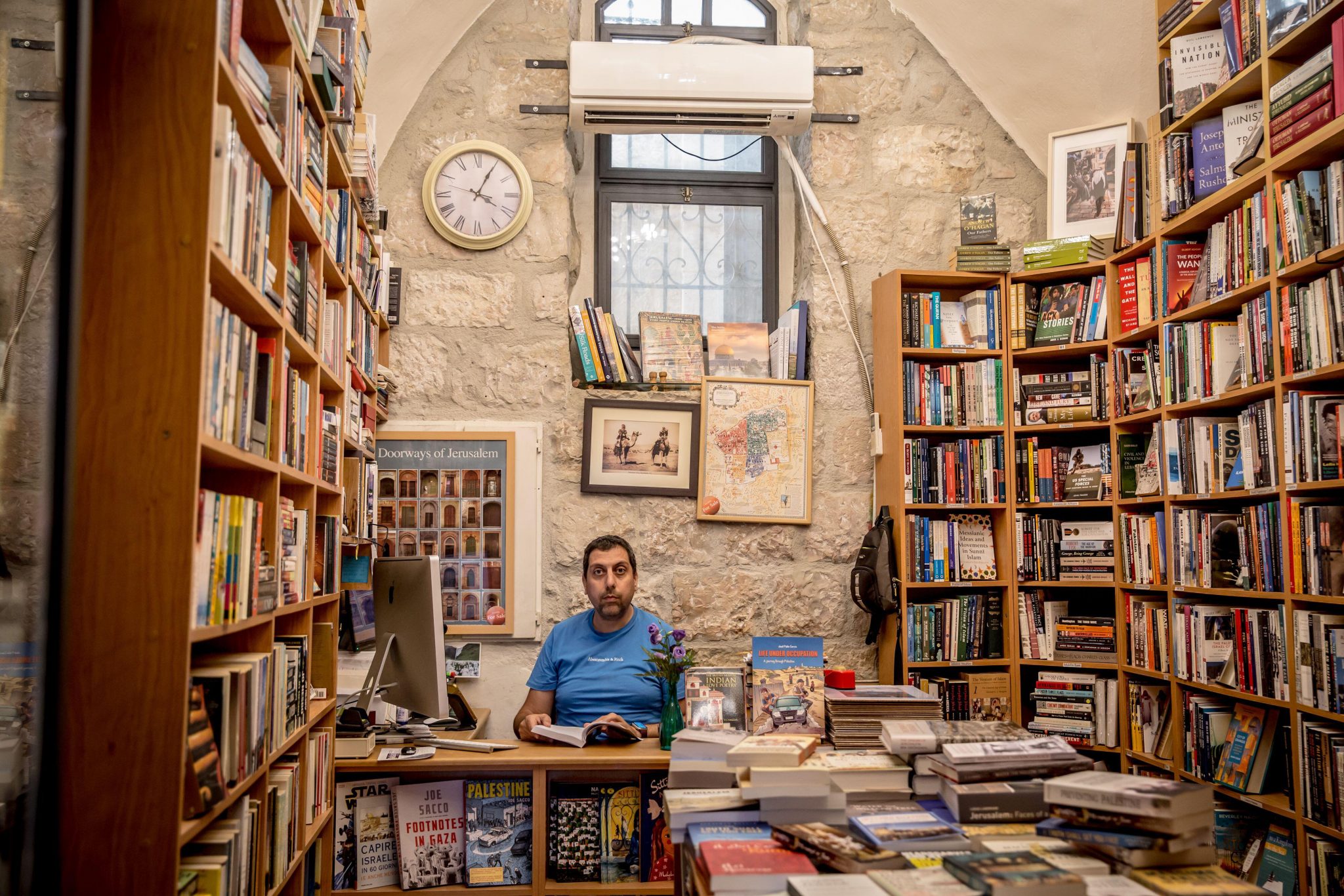The real threat posed by detained booksellers Mahmoud and Ahmad Muna is their willingness to engage with Jewish-Israelis amid a state narrative that demonises Palestinians
When Israeli police barged into the Educational Bookshop in East Jerusalem this week, they were looking for seditious material, although what exactly this really meant was not clear even to them. The plain-clothed officers could not read Arabic, instead using Google Translate on their phones to scan the books as their search focused on titles including the words ‘Hamas’, ‘Palestine’ or ‘Antisemitism’. When the owner of the shop, Mahmoud Muna, later described it, with his typical understated humour, it sounded almost like a scene of absurd theatre. Mahmoud and his nephew Ahmad were arrested for the cryptic charge of ‘disrupting public order’ and faced short interrogations in the police station. They spent two nights under arrest, in harsh conditions. The police wanted to keep them for another week, after finding in the shop a colouring book featuring vignettes of the Palestinian struggle for freedom. Mahmoud and Ahmad remain under house arrest.
At a moment when the US president promises to forcibly expel millions of Palestinians from Gaza, a police raid on a bookshop is hardly an escalation. For many decades, Israel has been harassing and arresting Palestinian artists and intellectuals, and shutting down cultural institutions on spurious grounds. One famous example is the national Palestinian Theater Al-Hakawati, just 500 meters from the Educational Bookshop, which was shut down numerous times in the 1970s and 1980s when it was a hub of Palestinian cultural resistance.
All this pales in comparison with the wholesale annihilation of Gaza’s cultural infrastructure since 7 October 2023, in what many have termed scholasticide. 80 percent of Gaza’s schools and all twelve of its university campuses have been destroyed. Archives, libraries, cultural centers, museums and bookstores lay decimated, including (among many) the Edward Said Public Library, attacked in January 2025. Poets like Refaat Alareer, painters like Heba Zagout and playwrights like Inas al Saqa were among the tens of thousands killed in Israeli bombings. The systematic targeting of cultural and education institutions appears as a rigorous attempt to wipe out any conditions for artistic creation.
And yet, even if Israeli repression in East Jerusalem is of a far less violent nature, it merits attention. The Educational Bookshop is one of the most celebrated Palestinian institutions of culture. A modest space, elegant and unpretentious, it is located in Salah al-Din Street, not far from the Old City, and has a branch in the American Colony hotel. It’s a must-see on tours to East Jerusalem, and a favourite among writers, diplomats and, simply, book lovers. So in the often-turbulent environment of East Jerusalem, where police crackdowns are frequent, the Bookshop has been an oasis – a welcoming space for all visitors, including Jewish Israelis, even in a reality where many Palestinians disavow contacts with Israeli society. Following the arrest of Ahmad and Mahmood Muna, several Israeli tour guides spoke of the experience of bringing Israeli groups to the shop – from government employees to ultra-Orthodox Jews. The shop owners were keen to communicate the Palestinian perspective on the history and present of injustice, occupation and dispossession. ‘My groups did not always like what [the Munas] had to say… but the discussion was always respectful, genuine, and completely honest,’ wrote one guide.
Indeed, the Munas’ willingness to engage with Jewish-Israelis seems, perhaps, the greatest threat they pose for the current Israeli government, which presents all Palestinians as terrorists. Those who are firmly committed to nonviolence, and to fighting injustice with literature, are a real danger to that narrative. The attack on the bookshop is part of an escalating campaign of repression against cultural institutions in Israel and East Jerusalem. Those targeted include Palestinians but also Jewish Israelis. In 2024, a documentary film 1948: Remember, Remember Not, which seeks to bring the Palestinian narrative of the Nakba alongside the Israeli one, was banned by Israel’s Film Review Council (the decision was later reversed). Produced by Jewish Israeli director Neta Shoshani, the film was commissioned by the Israeli public channel, but its screening has been postponed indefinitely. Two other film screenings were stopped by police in 2024 (Lyd, co-directed by Rami Younis and Sarah Friedland, and Muhammad Bakri’s Janin, Jenin 2024), while Palestinian artists, actors and singers working in Israel have faced harassment and arrests.
Art may not save us, but literature still has the power to mobilise, as shown by the numerous foreign diplomats that showed up in Jerusalem’s Magistrate’s court for the Munas’ arrest hearings; and the global reporting on the bookshop’s case. And perhaps, above all, the crowd of Jerusalemites that filled the bookshop in the days following the arrest, Palestinians, foreign expats and Jewish Israelis, that came to express their support and outrage, through buying books.
Yair Wallach is a social and cultural historian of modern Palestine and Israel and a reader in Israeli studies at SOAS, University of London
